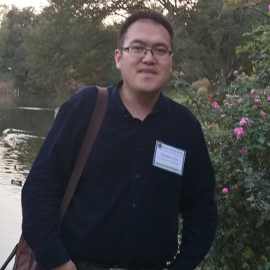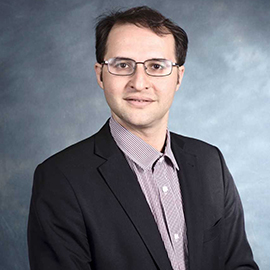To help us to get 2021 off to a flying start, we wanted to introduce our two newest faculty members in Asian Studies! Hessam Dehghani is our new Assistant Professor of Teaching (Persian Language and Culture); and Zhaokun Xin is our newest Lecturer in Chinese Language!
Hessam Dehghani
Could you tell us a little about your academic background prior to coming to UBC?
I was born in a very traditional Iranian family where religion and literature were an integral aspect of our upbringing. Just to give you a snapshot, I was encouraged by my parents to memorize the Qur’an and was asked to be able to recite the poetry of Saadi and Hafiz by heart. Indeed, it took me my whole academic life journey to realize the complicated relation between Persian language and culture and Islamic identity. My father also insisted from a very early age for me to begin learning English and by the time I graduated from high school I was already teaching English as a foreign language in Iran.
Since then, I have been oscillating between teaching and research. On the one hand, I pursued the knowledge of psychology and linguistics and the practice of teaching and on the other hand, I was intrigued by philosophy and literature. The field of Linguistics was a gateway to both and I did a masters in linguistics at Tehran University and a PhD at Allameh Tabatabai University. For my dissertation, I took up an interdisciplinary work between philosophy, literature, and linguistics, titled “A Systemic Functional Analysis and Hermeneutic Interpretation of a Modern Short Story,” which was an intervention in literary theory and is going to be published in Persian in Tehran soon. The task of taking up a hermeneutic project was so daunting that I had to seek help. I took a research sabbatical for a year at the University College Dublin to study the Hermeneutic Study of Literature with Professor Richard Kearney /kārnī/ among others. In 2011, he encouraged me to change my focus from Modern Literature (my first dissertation) to Medieval mystic literature and religious experience. He introduced me to a colleague of his at Boston College who later changed my way of thinking and living for good – Professor James Morris, a scholar of Islamic Philosophy and Mysticism, a man of multiple talents and expertise.
Under his and Richard Kearney’s supervision I wrote a second PhD in Philosophy at Boston College. My whole philosophical research project between 2012 and 2019 has been focused on the question of how following a religious and cultural tradition constitutes the being of a community. Papers have yet to be published from this work. For now, one is under review and another just published in the First Iranian Yearbook of Phenomenology. I have also given several talks and presentations at Harvard University and elsewhere.
Now, all along during my undergrad in English and masters and PhD in Iran, I was a part time instructor and Language Teaching enthusiast as well. I took almost 20 different courses in Teaching English as a Foreign/Second Language and Teaching Exam Classes to the point that by 2012, I only taught Teacher Education Courses rather than English itself. My expertise in teaching languages came handy in America too where for the past 8 years I have been teaching Farsi and Arabic at Boston College and developed a new Persian curriculum for them. I was awarded a teaching excellence award at BC as well.
Could you tell us what/who first encouraged you to go into an academic career? Can you recall a particular mentor or incident that maybe contributed to this?
Let me answer this question with this anecdote. In 2010, when I was first introduced to Professor James Morris and his work, I had a PhD in linguistics and was offered a safe academic job and a rather secure future. Yet, only one look at his CV was enough for me to realize how much I still have to learn and what a rare and great opportunity is to work with such a versatile scholar. He is one of the last of his generation of Iranian Studies scholars that I was only familiar with through their books and the books of their students. At that time I only had a small car. I sold it and paid the initial expenses to go work with him in America.
What are some other interests you enjoy pursuing outside of your work?
To be honest, there is no outside work for me. What I do like is Persianate culture and I am deeply occupied with all aspects of it all the time. I have been a member of several Poetry readings groups in Boston where we read Shahnameh of Ferdowsi. I am beginning a short story reading group here in Vancouver with my students first but I am looking to open it to the public. I have always been interested in Persian Calligraphy and music too and have studied singing and playing the Iranian instrument (Tar) in Iran. I do not have a great voice but I can sing and I understand Persian Music pretty well. Aside from these, I love cinema. I have always taught my philosophy courses using a lot of movies and I have a good command of the history of cinema especially Iranian Cinema. At BC we held movie nights every month as part of my Persian courses where we saw some of the best Iranian shows and movies available.
Have you had to move in order to begin teaching with us for Term 2 of 2021, or are you able to remain where you currently are? Have there been any challenges involved with that?
For this semester I had to move from Boston which was a tortuous journey. With the pandemic and the fact that as an Iranian I had to apply for a Visa and work permit, it was almost impossible to get here on time. Alas, we did our part and made all the effort to do things right. The sad thing is that as an immigrant or a temporary worker there is a lot that is not in your hand. A lot is contingent upon a people for whom we were regarded as “other.” I was reminded again and again that no matter how many PhDs you have or how enthusiastic you are to sacrifice for your students, some officer can hold you at a gate to miss your flight and have to spend a night in the middle of nowhere with family. When I was younger this was an adventure for me, but now for some reason it reminded me of the bitter taste of being considered a foreigner again. After settling down in America for a while, I was reminded that I had to apply again and again to establish my status as a temporary worker and bear the heavy psychological toll of being always an alien resident that I am.
Can you tell us what you will be teaching within UBC’s Asian Studies department and anything particular that you like your students to know before taking your classes?
I will be teaching Introductory Persian courses as well as a course in Modern Persian Literature. All of my courses are taught remotely but synchronously. What I would promise in these courses is that the students are not going to experience a bad replica of in-person classes but a totally new experience. I take online teaching very seriously and I believe it is the future of teaching in some way or another even after we begin teaching in person again. Besides, I am going to hold regular literature reading classes where I read and analyze modern short stories with students and anyone who is interested. I am looking for interest and opportunity for Medieval mystic literature which is my passion and expertise as well.
Zhaokun Xin

Could you tell us a little about your academic background prior to coming to UBC?
It took me some time to figure out where my research interests lay. I hold a BBA in Marketing from HKU and an MA in Translation from SOAS, University of London. However, I eventually wrote a doctoral dissertation on anger in Ming-Qing literature for my PhD at Arizona State University. It seemed a circuitous path, both literally and intellectually, to what I’m currently teaching and researching. But I deeply cherish the interdisciplinary training I received and the international educational experience I was exposed to.
Could you tell us what/who first encouraged you to go into an academic career? Can you recall a particular mentor or incident that maybe contributed to this?
When I was an MA student at SOAS, I took two seminars with Prof. Tian Yuan Tan on Sinological methodology and traditional Chinese literature. Prof. Tan did an amazing job of drawing our attention to the unfamiliar within the seemingly familiar literary pieces and historical documents from ancient China. He first introduced me to the fascinating world of Ming-Qing literature and encouraged me to pursue further, and indeed, I haven’t walked out of that world ever since.
What are some other interests you enjoy pursuing outside of your work?
It is absolutely a luxury to combine my research with my interests, and I’m deeply into reading Ming-Qing fiction and drama for both fun and studies. In addition, I sometimes divert myself in the literary landscapes of Edo Japan and early twentieth century Britain. Besides reading, I enjoy swimming, running elliptical machines, and watching horror films. A hobby I’m currently developing is to walk as much as possible in the sunshine between drizzles in Raincouver.
We understand it was been a lengthy journey and multiple paperwork involved for you to begin teaching with UBC – in a “nutshell”, could you please tell us a little more about that process?
It was indeed strenuous to deal with immigration paperwork during a pandemic, but the constant help and support from both our department and the HR immigration team alleviated a lot of stress and made the process much smoother. The silver lining among the pandemic is that I get the opportunity to virtually sit in many meetings and lectures organized by our department, the Chinese Language Program, and the anti-racism committee, to name just a few. I thank our wonderful colleagues for warmly making me feel being part of the department long before my arrival in Canada.
Can you tell us what you will be teaching within UBC’s Asian Studies department and anything particular that you like your students to know before taking your classes?
I’ll be teaching courses on Chinese literature and films, particularly focusing on the modern and contemporary periods and Chinese fantasy literature. In my classes, I attach great importance to close reading, critical thinking, and creative ways of storytelling. Thus, I’d like my students to not only showcase their creativity in adapting stories across different media, but also get ready for articulating their own voices regarding some profound questions. Our class sessions will be an ideal platform for both. Ultimately, I hope that the literary works we’ll be examining in class will touch my students as much as, if not more than, they have moved me.
Thank you so much for your time, Hessam and Zhaokun! We hope that you enjoy being part of the Asian Studies family.



